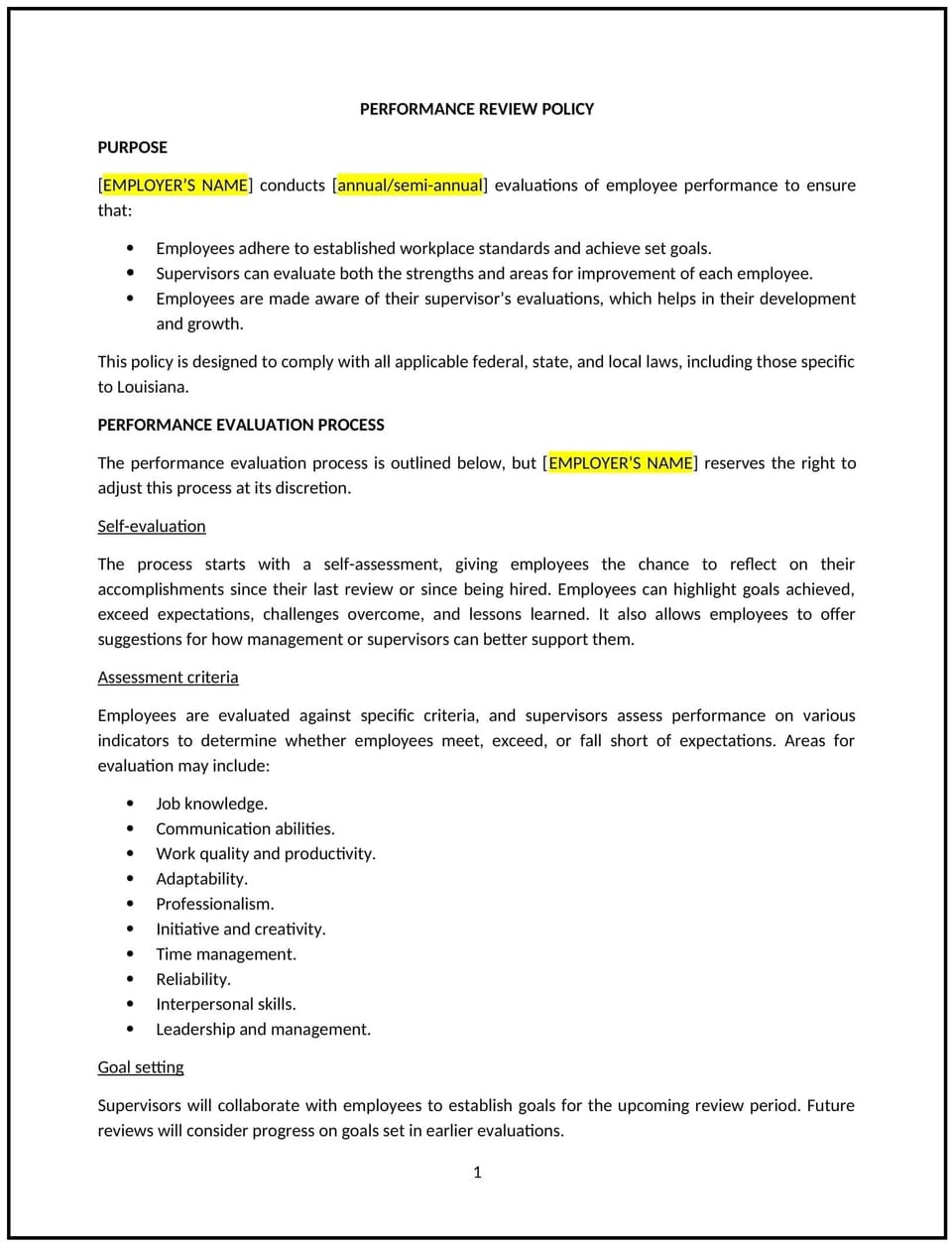Performance review policy (Louisiana): Free template

Performance review policy (Louisiana)
This performance review policy is designed to help Louisiana businesses establish a structured approach to evaluating employee performance. It outlines the frequency, process, and goals of performance reviews, fostering professional growth and aligning employee contributions with business objectives.
By implementing this policy, businesses can enhance productivity, support development, and create a culture of accountability.
How to use this performance review policy (Louisiana)
- Define review frequency: Specify how often performance reviews will be conducted, such as annually, semi-annually, or quarterly.
- Outline the review process: Include steps such as self-assessment, manager evaluation, and one-on-one discussions.
- Establish evaluation criteria: Detail the metrics or goals used to assess performance, such as productivity, teamwork, or goal achievement.
- Provide feedback guidelines: Clarify how feedback will be delivered, emphasizing constructive and actionable insights.
- Include documentation requirements: Specify how reviews will be recorded, shared, and stored for future reference.
- Address development plans: Outline how performance reviews will lead to personalized development goals or training opportunities.
Benefits of using a performance review policy (Louisiana)
Implementing this policy provides several advantages for Louisiana businesses:
- Encourages growth: Helps employees identify areas for improvement and recognize strengths.
- Aligns goals: Ensures employee objectives are in sync with business priorities.
- Promotes accountability: Establishes a transparent system for evaluating performance.
- Enhances communication: Facilitates meaningful conversations between employees and managers.
- Reflects Louisiana-specific practices: Adapts to local workplace dynamics and employee expectations.
Tips for using this performance review policy (Louisiana)
- Train managers: Provide training on conducting fair and effective performance reviews.
- Set clear expectations: Communicate performance standards to employees at the start of the review period.
- Focus on development: Emphasize growth opportunities and actionable feedback in every review.
- Monitor progress: Regularly check in with employees between formal reviews to track improvements and address challenges.
- Update regularly: Revise the policy to reflect changes in workplace practices or Louisiana-specific needs.
Q: How often should performance reviews be conducted?
A: Reviews are typically conducted annually, but businesses may choose semi-annual or quarterly reviews depending on operational needs.
Q: What criteria are used to evaluate employee performance?
A: Evaluation criteria may include job-specific metrics, goal achievement, teamwork, communication skills, and professional development.
Q: How should managers prepare for performance reviews?
A: Managers should gather relevant data, review past performance, and prepare specific feedback to discuss during the review.
Q: What happens if an employee disagrees with their performance review?
A: Employees can discuss their concerns with their manager and provide additional context or documentation to address discrepancies.
Q: Are performance reviews documented?
A: Yes, all reviews should be documented and stored securely for reference during future evaluations or promotions.
Q: How are development plans incorporated into performance reviews?
A: Managers and employees collaborate to create personalized goals, identify training opportunities, and track progress over time.
Q: How often should this policy be reviewed?
A: The policy should be reviewed annually or when changes in business operations or Louisiana-specific practices occur.
This article contains general legal information and does not contain legal advice. Cobrief is not a law firm or a substitute for an attorney or law firm. The law is complex and changes often. For legal advice, please ask a lawyer.


